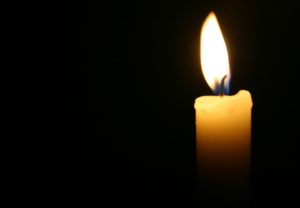Putting our Talents to God’s Use
a sermon on Matthew 25:14-30
The Rev’d Adam Brown
Putting our Talents to God’s Use
a sermon on Matthew 25:14-30
The Rev’d Adam Brown

prepared by the Rev’d Adam Brown
14 “For it is as if a man, going on a journey, summoned his slaves and entrusted his property to them; 15 to one he gave five talents,[f] to another two, to another one, to each according to his ability. Then he went away. 16 The one who had received the five talents went off at once and traded with them, and made five more talents. 17 In the same way, the one who had the two talents made two more talents. 18 But the one who had received the one talent went off and dug a hole in the ground and hid his master’s money. 19 After a long time the master of those slaves came and settled accounts with them. 20 Then the one who had received the five talents came forward, bringing five more talents, saying, ‘Master, you handed over to me five talents; see, I have made five more talents.’ 21 His master said to him, ‘Well done, good and trustworthy slave; you have been trustworthy in a few things, I will put you in charge of many things; enter into the joy of your master.’ 22 And the one with the two talents also came forward, saying, ‘Master, you handed over to me two talents; see, I have made two more talents.’ 23 His master said to him, ‘Well done, good and trustworthy slave; you have been trustworthy in a few things, I will put you in charge of many things; enter into the joy of your master.’ 24 Then the one who had received the one talent also came forward, saying, ‘Master, I knew that you were a harsh man, reaping where you did not sow, and gathering where you did not scatter seed; 25 so I was afraid, and I went and hid your talent in the ground. Here you have what is yours.’ 26 But his master replied, ‘You wicked and lazy slave! You knew, did you, that I reap where I did not sow, and gather where I did not scatter? 27 Then you ought to have invested my money with the bankers, and on my return I would have received what was my own with interest. 28 So take the talent from him, and give it to the one with the ten talents. 29 For to all those who have, more will be given, and they will have an abundance; but from those who have nothing, even what they have will be taken away. 30 As for this worthless slave, throw him into the outer darkness, where there will be weeping and gnashing of teeth.’

Take eight coins, or draw them on a piece of paper. Assign each with a gift God has given you – it could be a talent or skill, a vocation, some aspect of your life, etc.. For each one, think of how you can nurture it and help it grow, and imagine all the good that it could do. Now go back and, for each, think about what would happen if you hid those gifts away from the world.
On a piece of paper, draw or list eight things that help you nurture your own “talents” or gifts from God. It could be a tool or a device, a person, a place, etc. You could draw or list one per day, or all at once and reflect on each one throughout the week.

In the parable, we hear an encouragement to invest the “talents” we have been given, rather than hide them away out of fear or laziness. The third servant was told he could have gone to those more knowledgeable for help. Take a moment and think of all those in your life who have helped you, both in general and spiritually. Were there moments in your life when you returned the favour?

Take a moment and learn about the Community Ministries operated throughout the Diocese of Ottawa. There are six main ones, so perhaps you can choose one per day this week and learn about all the good ways those around us are “investing” their “talents”.
https://www.ottawa.anglican.ca/community-ministries

Holy God, we do not always understand your word or your ways.
Give us wisdom and imagination and courage as we learn and grow.
The story this week has made me wonder about…
(what questions are still on your heart?)
Receive my questions and help me hear your answers.
The story this week has filled me with…
(how are you feeling?)
Accept my praise, heal my hurt, ease my worry.
The story this week has reminded me of…
(are there situations or people you are thinking of?)
Be with all who are in need of you.
In Jesus’ name, we pray.
Amen.
Keeping our lamps full and our ears open
a sermon on Matthew 25:1-13, with an assist from Anne Shirley
The Rev’d Rhonda Waters

prepared by the Rev’d Rhonda Waters
Jesus said, “Then the kingdom of heaven will be like this. Ten bridesmaids took their lamps and went to meet the bridegroom. Five of them were foolish, and five were wise. When the foolish took their lamps, they took no oil with them; but the wise took flasks of oil with their lamps. As the bridegroom was delayed, all of them became drowsy and slept. But at midnight there was a shout, ‘Look! Here is the bridegroom! Come out to meet him.’ Then all those bridesmaids got up and trimmed their lamps. The foolish said to the wise, ‘Give us some of your oil, for our lamps are going out.’ But the wise replied, ‘No! there will not be enough for you and for us; you had better go to the dealers and buy some for yourselves.’ And while they went to buy it, the bridegroom came, and those who were ready went with him into the wedding banquet; and the door was shut. Later the other bridesmaids came also, saying, ‘Lord, Lord, open to us.’ But he replied, ‘Truly I tell you, I do not know you.’ Keep awake therefore, for you know neither the day nor the hour.”

This is certainly not what the bridesmaids were carrying but it’s pretty cool – all you need is a bowl, some olive oil, and 100% pure cotton balls!
Check out the video here.
We have been waiting for the pandemic to end for over six months. When this started, people stocked up on toilet paper and flour and take out menus. We’re into a different phase of waiting now but responsible preparation is still needed. What do you need to do to make sure you are ready for the wait? Go ahead and do it.

The bridesmaids needed enough oil to sustain them while they waited to meet the bridegroom and go to the party. What sustains you as you wait? Are you at risk of running low? How do you replenish it?
Imagine yourself as one of the foolish bridesmaids. How did you feel when the so-called wise bridesmaids refused to share their oil? When you found yourself locked out of the party?
Now imagine yourself as one of the wise bridesmaids. How did you feel when the so-called foolish bridesmaids asked for your oil? When you went into the party? When you heard the other bridesmaids knocking at the door?
What real world scenarios produce these emotions for you?

by Raj Bharat Patta on the blog Political Theology
The Parable of the Ten Virgins, a rare example of women appearing in the parables and sayings of the gospel, invites us to consider challenging questions of representation.
read more.

Holy God, we do not always understand your word or your ways.
Give us wisdom and imagination and courage as we learn and grow.
The story this week has made me wonder about…
(what questions are still on your heart?)
Receive my questions and help me hear your answers.
The story this week has filled me with…
(how are you feeling?)
Accept my praise, heal my hurt, ease my worry.
The story this week has reminded me of…
(are there situations or people you are thinking of?)
Be with all who are in need of you.
In Jesus’ name, we pray.
Amen.
Stories of the Saints of our Lives
told by members of Church of the Ascension
Church of the Ascension is a parish of the Anglican Diocese of Ottawa,
and the Anglican Church of Canada.
We stand on the traditional and unceded territory of the Algonquin Anishnabe nation.